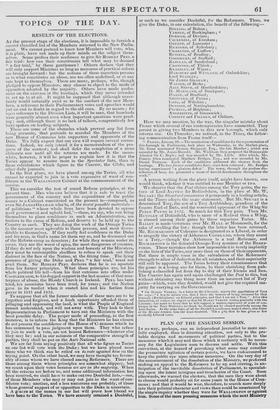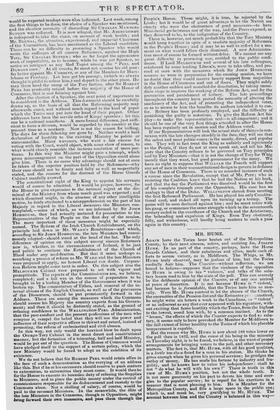PLAN OF THE ENSUING SESSION.
IN no way, perhaps, can an independent journalist be more use- fully employed, than in directing attention, not only to the pro- bable designs and movements of political parties, but to the measures which it may and those which it certainly will be neces- sary for the Legislature soon to discuss and settle. With this conviction, at the hazard of provoking what some may consider the premature agitation of certain points, we have endeavoured to keep the public eye upon ulterior measures. On the very day of the announcement of the dissolution of the Ministry, we preferred making an appeal to the Reformers to be up and stirring, in an- ticipation of the inevitable dissolution of Parliament, to speculat- ing upon the latent intrigues and treacheries of the Court. Soon afterwards, we warned the electors, that the men they were about to choose would probably sit for some years in the House of Com- mons; and that it would be wise, therefore, to search more deeply into their political character and views than could be ascertained by the simple inquiry whether they were for WELLINGTON or against him. Some of the more pressing measures which the next Ministry
would be expected to adopt were e'tso indicated. Last week, among the first things to be done, tire ehoice of a Speaker was mentioned,
and the absolute necessity even of impartiality, as to become, while he was yet Speaker, as active an intriguer as any Red Tapist among the " PEEL and DAWSON crew." At all events, he must not resume his old post : far better appoint Mr. Commis or any of the Members for Mary- lebone or Finsbury. Let him get his peerage, (which we alaays thought it pitiful to refuse him,) and depart to the other place. He may there head the rump of the Tory faction, after Sir ROBERT PEEL has prudently retired before the majority of the House of Commons, that is now forming against him. After the election of a Speaker, the next point of importance to be considered is the Address. This document should be carefully -drawn up, as the basis of all that the Reforming majority may afterwards enact, and without much regard to the kind of paper which the Tories may put into the hand of their puppet. Other addresses have been the servile echo of Kings speeches : let this one be a national manifesto. A mere formal difference, just suffi- cient to force a division, would be regarded by the country at the present time as a mockery. Now is not the season for trifling. The days for sham debating are gone by. Neither would a bald declaration of hostility to the existing Ministry be politic or statesmanlike. Many waverers, who want a fair excuse for voting with the Court, would object, with some show of reason, to what would closely resemble the factious resolution of mere par- tisans. In this way the Minister might gain a triumph, which gross mismanagement on the part of the Opposition could alone give him. There is no cause why advantage should not at once be taken of the superior position held by the Reformers—why their case should not he firmly and fully as well as respectfully stated, and the reasons for the distrust of the Horse Guards Cabinet manfully avowed. The constitutional right of the King to appoint his servants would of course be admitted. It would be proper, however, for the House to give expression to the national regret at the dis- missal of the Ministry from whom much good was expected ; and which dismissal might, in the absence of any other intelligible motive, be fairly attributed to a misapprehension on the part of his Majesty in regard to the Liberal measures the Ministers con- templated, —some of which, as we are informed by Sir JOHN HOBHOU SE, they had actually matured for presentation to the Representatives of the People on the first day of the session. The more important of these measures might be especially named. The Reform of the Irish Church Establishment, on the principle laid down in Mr. WARDS Resolutions—and which, according to Sir JOHN HOBHOUSE, the late Ministers had unani- mously adopted—should stand at the head of the list. The only difference of opinion on this subject among sincere Reformers now is, whether, in the circumstances of Ireland, it be just and politic to continue the Establishment of the Church of Blood under any modtfication. But that it must undergo as searching a process of reform as Mr. WARD and the late Ministers were prepared to apply, no honest Liberal can doubt. Corpora- tion Reform might come next in order. On this subject also the MELBOURNE Cabinet were prepared to act with vigour and promptitude. The reports of the Commissioners are, we believe, completed; and a bill was in the course of preparation to be brought in by a leading Member of the Government when it was broken up. The commutation of Tithes, and removal of the in- ternal abuses of the English Church, as well as of the grievances of the Dissenters, should be put prominently forward in the Address. These are among the measures which the Commons should assure his Majesty the country expects from his Govern- ment; and then it should be distinctly stated, as the ground of refusing confidence to the WELLINGTON-PEEL Administration, that the past conduct and the present professions of the men who compose it, compel the belief that they will use the power and influence of their respective offices to thwart and retard, instead of promoting, the reform of ecclesiastical and civil abuses. In this way, not only would the heaviest blow be dealt upon the Orange-Tory Cabinet in the most direct and constitutional manner, but the formation of a trimming, half and half Ministry, would be put out of the question. The House of COIMBODS would have pledged itself to the support of a certain policy, which the new Ministry would be forced to adopt as the condition of its existence. • We do not believe that Sir ROBERT PEEL would retain office in the face of such a demonstration as the carrying of an address like this. But if he or his successors should resolve to push matters to extremities, to extremities they must come. It would then be for the House to execute its bounden duty of refusing the Supplies to Ministers, and to place the public money under the control of commissioners responsible for its disbursement and custody to the Commons alone. Not a shilling of salary, of course, would be paid to the recusant Ministers. In the meanwhile, the elite of the late Ministers in the Commons, though in Opposition, might bring forward their own measures, and pass them through the. People's House. These might, it is true, be rejected by the Lords; but it would be of great advantage to let the Nation see clearly who were the obstructers of good measures—to have Minkterial go-betweens out of the way, and the Peers exposed, as they deserved to be, to the indignation of the Country. There is, however, not much probability that the Tory Ministry would hang together in spite of a resolute majority of Reformers in the People's House; and it may be as well to reflect for a mo- ment on what would follow their dismissal. A new Administra- tion must of course be formed without delay. We cannot see any great difficulty in procuring one, entitled to the public confi- dence. If Lord MELBOURNE and several of his late colleagues, reinforced by some leading Libetals, were to take office, and pro- ceed at once with the measures which Sir JOHN HOBHOUSE assures . us were in preparation for the ensuing session, we have no doubt that they would receive hearty support from majorities in the House of Commons and out of doors. They might safely defy another sudden and uncalled-for dissolution, by taking imme- diate steps to improve the working of the Reform Act, and for the prevention and punishment of bribery. The late proceedings throughout the country have proved the necessity of altering the machinery of the Act, and of protecting the independent voter, so as to secure to him the benefits its authors intended it to con- fer. Bribery has been profusely employed, and the difficulty of punishing the guilty is notorious. To give the Reform Act fair play—to make the representation real—is all-important; and it should be one of the very first things attended to after the House has been regularly set in motion and the Address voted. If our Representatives will look the actual state of thins.7s in con- nexion with the late changes steadily in the face, they will see that the safest and most politic course is the manly, direct, and popular one. They will in fact treat the King as unfairly and injuriously as the People, if they do not at once speak out, and tell his Ma- jesty that the Country refuses to be governed on Tory principles and by Tory Ministers—that it is not the change of Tory for Whig merely that they want, but good government for the many. We have no right to suppose that WILLIAM the Fourth will support any set of men in their unconstitutional design to govern in defiance of the House of Commons. There is no recorded instance of such a course since the Revolution, except that of Mr. Prier; who in resisting the Coalition knew that he had the Nation at his back, and that the day the Parliament was dissolved would be the first of his complete triumph over the Opposition. His case has no analogy to that of the Duke. WELLINGTON shrank from meeting the first Reformed Parliament. He has played his only Constitu- tional card, and risked all upon its turning up a trump. The game will be soon declared against him ; and he must retire with his gang, or commence the same struggle which in the seventeenth century ended in the overthrow of the Church and the Aristocracy, the beheading and expulsion of Kings. Even Tory obstinacy, folly, and wickedness, will hardly bring matters to such a pass again in this country.



























 Previous page
Previous page